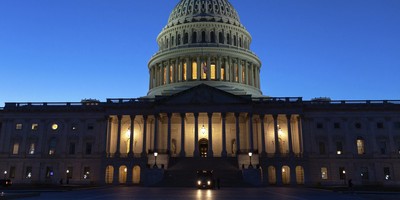Pomp and circumstance depends a lot more on circumstance than pomp. The 396 graduates of Morehouse College in Atlanta learned that in an unforgettable way the other day at their commencement ceremony. The graduates whooped it up with their families and friends, with plenty to whoop it up for. The commencement speaker surprised them with the announcement that he was going to pay off all their student loans.
Robert F. Smith, a billionaire investor, certainly deserved his honorary degree, and the Class of '19 was suddenly freed from burdensome college debt, relieved of monthly payments on their loans. They could now change their calculations for the future.
"We're going to put a little fuel in your bus," he told them, and suddenly, the sun was providing not so much heat as light, a source of driving energy. "Let's make sure every class has the same opportunity going forward," he said, "because we are enough to take care of our own community."
It was a moment for taking to heart the exhortation from their benefactor to pursue the American Dream through action, word and deed, for themselves and for those who will follow in their footsteps. The successful investor, who was a large donor to the National Museum of African-American History and Culture on the Mall, added to that history with an investment that could bring big returns for black America.
Morehouse College was founded as an all-black college two years after the end of the Civil War to educate freed slaves and, in particular, to guide those who wanted to enter the Christian ministry. Its most famous alumnus is Martin Luther King Jr., who showed as a student with mediocre grades that he had a gift for oratory, if not for academics. But he argued in The Maroon Tiger, the college newspaper, that education has both a utilitarian and a moral function, "to teach one to think intensively and to think critically." Robert Smith was acting on that acquired wisdom.
Recommended
The billionaire's gift was both refreshing and bountiful, running against the cliched and hackneyed rhetoric of many contemporary commencement speeches. He refrained from the vogue of calling for reparations, as did many of the Democratic candidates for president. Smith's gift, estimated to be worth $14 million, is about investing in opportunity in the future, not bemoaning the sins of the past.
In its beneficence, it outshines the victimization debate in the academy, abetted by The College Board, which administers the SAT exam that largely determines the acceptance rates to elite colleges. The College Board says it will add "adversity" to the scoring of the exam to make the playing field friendlier for the disadvantaged. Students who suffer socioeconomic deficiencies in three categories, home, neighborhood and school, will be rewarded for the unseen circumstances they might have endured, rather than their actual accomplishments. The worse the adversity, the higher the SAT score.
If, for example, an SAT test taker lives in a high-crime neighborhood, was raised by a single impoverished parent or attended a dreadful school in a low-income neighborhood, misfortune becomes good fortune. Such bizarre math may add up on paper, and even draw attention to real problems. But creating a level playing field this way can create an obstacle course harming those who suffer adversity in privileged circumstances that can't be measured on a victim measuring stick. Consider the adversity of having to care for a disabled sibling while attending a good school, or living with high-income parents who are abusive or remote. The adversity index merely reduces the whole person to the sum of negative parts.
The SAT initiative poses problems similar to those imposed by affirmative action, discriminating against categories of people not included in the accepted hierarchies of suffering. J.D. Vance, who went to Ohio State University and Yale Law School and wrote the best-selling book "Hillbilly Elegy," points out how, on the checklist of affirmative action, he is a big-time loser because he is white, male, straight and Protestant. I have no idea how he scored on his SAT, but the prejudice against him and those like him, despite poverty and hardship, assures his coming up short on sympathy in the measurements of identity politics and the accepted culture of victimhood.
Critics of Robert Smith's gift to the Morehouse Class of '19 complain that it's a one-shot deal and does nothing to solve the larger problem of the high price of college and stultifying debt students incur. True enough.
But as John F. Kennedy reminded us in a previous century, life is unfair, proving again that where you stand is caused by where you're sitting. One graduate, thrilled by the liberation of being debt-free, told The New York Times, "The fact that I know somebody who paid off $98,000 of my student loans makes me just want to go out and just give to people even more than I did before." That's not bad as inspiration, and it beats the bitterness of victimhood.

























Join the conversation as a VIP Member